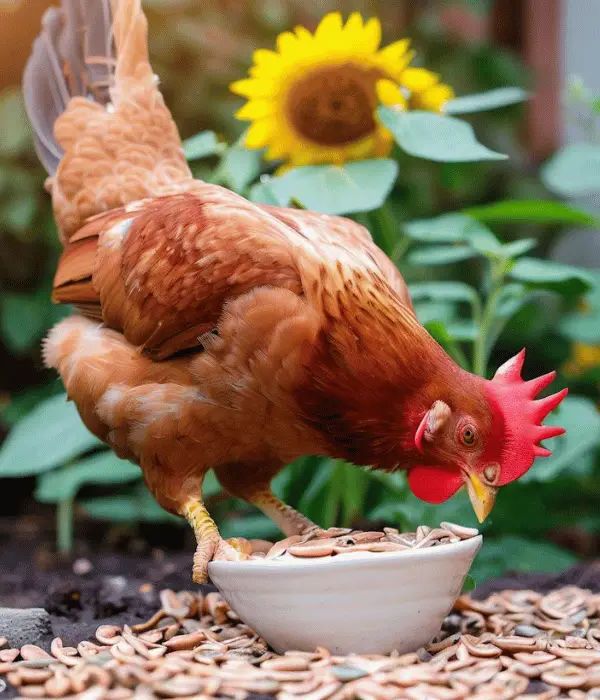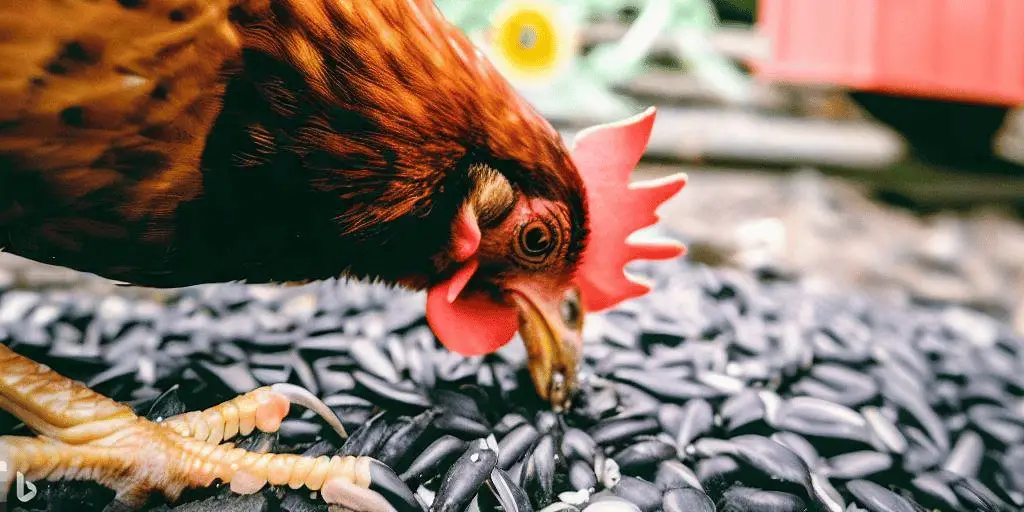You’ve likely heard about the benefits of sunflower seeds for chickens, but perhaps you still need to decide whether and how to incorporate them into your flock’s diet.
Well, you’re in the right place. In this comprehensive guide, we’ll discuss feeding sunflower seeds to chickens, their nutritional value, their benefits, and the best types to choose from.
We’ll also address common misconceptions, explaining when and how to introduce these seeds safely to your birds.
Sunflower seeds are a prevalent food choice for many bird species, and poultry birds are no exception. They are rich in essential nutrients, providing a healthy and tasty addition to your chicken’s menu.
Understanding the nutritional makeup of sunflower seeds and how it influences chicken health and productivity is vital.
This knowledge will empower you to make informed decisions about your flock’s diet to promote their well-being and enhance their performance.
The Nutritional Value of Sunflower Seeds for Poultry Birds

The benefits are numerous regarding the nutritional value of sunflower seeds for chickens. These seeds are packed with protein, healthy fats, and essential minerals.
They are particularly rich in vitamin E, a potent antioxidant crucial in maintaining healthy skin and feathers.
Moreover, they are a good source of selenium, a mineral necessary for proper growth and fertility in chickens.
The Nutritional Chart (Per 100g Seeds)
- Protein: 20 g
- Fat: 51 g
- Fiber: 8.6 g
- Vitamin E: 35.17 mg
- Selenium: 53 mcg
By comparing these nutritional facts with the dietary needs of chickens, it’s clear that sunflower seeds can significantly contribute to your flock’s diet.
However, they should be one of many food sources, as poultry birds need a diverse diet to meet all their nutritional needs.
Benefits of Black Oil Sunflower Seeds for Chickens
- Kaytee Black Oil Sunflower is the best single grain for...
- High Oil Content Provides Birds Their Necessary Year...
- Appealing to smaller song birds such as Cardinals and...
- Thinner hulls make it easier to eat
- Available In 5-Pound
Last update on 2025-07-15 / Affiliate links / Images from Amazon Product Advertising API
When discussing the benefits of sunflower seeds, it’s impossible to overlook black oil sunflower seeds.
These seeds are a favorite among poultry keepers due to their high oil content, which provides an energy boost and helps chickens maintain their body temperature during cold weather.
Black oil sunflower seeds are also high in protein, aiding muscle development and egg production in laying hens. The dark shells are also a natural source of grit, aiding digestion.
The seeds’ high oil content also contributes to shinier feathers, making your flock look healthier and more attractive.
Best Sunflower Seeds for Chickens: A Comparison
Choosing the best sunflower seeds for chickens can be tricky, given the variety available on the market. The two most common types are black oil sunflower and striped sunflower seeds.
As mentioned earlier, the former are rich in oil, making them an excellent energy source. Striped sunflower seeds, however, have less oil but more fiber.
Both types have benefits, and the choice ultimately depends on your goals. If you want to increase your flock’s energy levels and enhance their feather quality, black oil sunflower seeds are your best bet.
However, striped sunflower seeds are an excellent choice to improve your flock’s digestion and maintain a healthy weight.
The Correct Age to Introduce Sunflower Seeds to Chickens
If you’re wondering what age flocks can eat sunflower seeds, the answer is as little as six weeks old. However, it’s essential to start with small quantities and gradually increase the amount as they grow.
Sunflower seeds should only make up 10% of your chicken’s diet. They should be viewed as a supplement to a balanced feed, not a replacement.
How to Safely Feed Sunflower Seeds to Chickens?

While sunflower seeds are beneficial for chickens, they must be fed properly. Unhulled sunflower seeds need to be broken down before feeding to prevent choking.
You can do this by crushing the seeds or soaking them in water for 24 hours. This process makes the seeds easier to digest and allows your chickens to access the nutrient-rich kernel.
Ensure your birds always have access to fresh water when feeding sunflower seeds. The high-protein content can make chickens thirsty, and providing water helps ensure they stay hydrated.
Are Sunflower Seeds OK for Chickens? Debunking Myths
Many myths surround the question, “Are sunflower seeds OK for chickens?” One of the most common misconceptions is that sunflower seeds harm poultry flocks. This is untrue. When fed in moderation, sunflower seeds are safe and beneficial for chickens.
Another myth is that sunflower seeds can make poultry birds fat. While it’s true that sunflower seeds are high in fat, they won’t cause weight problems if appropriately fed. The key is to limit their intake and ensure they are part of a balanced diet.
The Impact of Sunflower Seeds on Chicken Feed
Adding sunflower seeds to chicken feed can significantly impact their health and productivity. They can increase the nutritional value of the feed, improve the chickens’ appearance, and boost their energy levels.
However, it’s important to remember that sunflower seeds should not replace other essential elements of chicken feed. They should complement, not compete with, other food sources.
Case Studies: The Effect of Sunflower Seeds on Chicken Health and Productivity
- Attracts the widest variety of birds
- Thin shelled sunflower - makes it easy for small beaked...
- This seed has the high energy content that all birds...
- Highest quality grains used
- Made in the USA
Last update on 2025-07-15 / Affiliate links / Images from Amazon Product Advertising API
Several studies have investigated the effects of sunflower seeds on chicken health and productivity.
One study found that hens fed with sunflower seeds had a higher egg production rate than those without. Another study strongly suggested that chickens fed sunflower seeds had shinier feathers and were more active.
These findings highlight the positive impact that sunflower seeds can have on chicken health and productivity.
However, more research is needed to fully understand the long-term effects of sunflower seeds on chickens and determine the optimal feeding guidelines.
Conclusion
In conclusion, sunflower seeds can be a valuable addition to your chicken’s diet. They provide essential nutrients, improve the appearance of your flock, and can enhance productivity.
However, like all good things, they should be used in moderation. Incorporating sunflower seeds into your chicken’s diet requires knowledge and care.
But with the right approach, you can harness their benefits and help your flock thrive. Remember, a healthy chicken is a happy chicken.
Why not give sunflower seeds a try? Your chickens will thank you for it!




